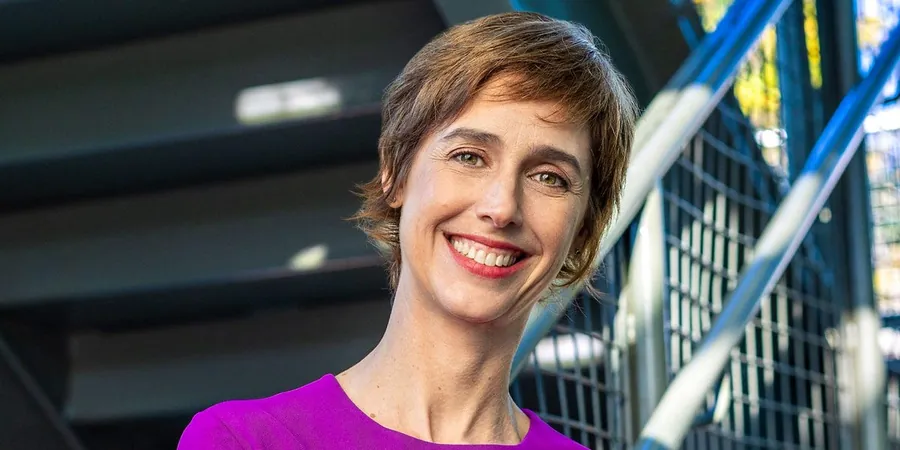
Key AI Leader Joelle Pineau Exits Meta, Leaving Billions in Investments at a Crossroad
2025-04-01
Author: Yan
In a surprising turn of events, Joelle Pineau, Meta's head of artificial intelligence research, is set to leave the company during a critical phase as the tech giant invests billions to maintain its competitive edge in the rapidly evolving AI landscape.
Pineau, who has been a pivotal part of Meta since 2017, serving as both the vice president of AI research and the leader of the Fundamental AI Research group, announced her departure through a LinkedIn post on Tuesday. Her final day at the company will be May 30. In her statement, she expressed a mix of gratitude and optimism: “Today, as the world undergoes significant change, as the race for AI accelerates, and as Meta prepares for its next chapter, it is time to create space for others to pursue the work. I will be cheering from the sidelines... ”
Meta's spokesperson thanked Pineau for her leadership, highlighting her contributions to open source initiatives and scientific breakthroughs that have advanced Meta’s AI capabilities. However, the spokesperson did not disclose if a search for her successor has already begun.
Joelle Pineau led a formidable team of approximately 1,000 individuals across ten locations at Meta. Following her exit, Pineau plans to take a reflective pause and will continue her academic role as a computer science educator at McGill University in Montreal.
Her departure raises concerns for Meta as it strives to compete against heavyweights like OpenAI, Anthropic, and Elon Musk’s xAI. Under the leadership of CEO Mark Zuckerberg, Meta has allocated up to $65 billion this year for AI-related developments. A crucial part of this effort includes Meta's LLaMA, an open-source large language model that’s designed to rival proprietary offerings from competitors. Zuckerberg aims for LLaMA to set an industry benchmark, with aspirations that Meta's AI chatbot—accessible on platforms like Facebook, Instagram, and WhatsApp—could potentially reach a billion users this year.
In December, Meta reported that approximately 600 million users interacted with Meta AI each month, showing the significant traction it has gained. The company has recently reorganized its AI divisions to integrate Pineau's research unit closer to product development to expedite the use of those innovations across its services.
Pineau's journey in AI spans over two decades, beginning with her academic endeavors at the University of Waterloo. There, she contributed to developing a voice recognition system for helicopter pilots. She chose to join Meta due to the company's commitment to open science and the belief that significant industry innovations in AI would emerge there.
Notably, her exit is part of a broader trend of leadership transitions at Meta, which has also seen the departure of two other senior executives: Dan Neary, the vice president for Asia-Pacific, and Kate Hamill, the managing director for retail and e-commerce in North America, both of whom played vital roles in the organization.
As Meta navigates this tumultuous period of transitions and significant investments, the question remains: will the company be able to fill the void left by Pineau and maintain its ambitious trajectory in the fierce race for AI dominance? Stay tuned as we continue to cover the unfolding developments at one of the world's leading tech companies!



 Brasil (PT)
Brasil (PT)
 Canada (EN)
Canada (EN)
 Chile (ES)
Chile (ES)
 Česko (CS)
Česko (CS)
 대한민국 (KO)
대한민국 (KO)
 España (ES)
España (ES)
 France (FR)
France (FR)
 Hong Kong (EN)
Hong Kong (EN)
 Italia (IT)
Italia (IT)
 日本 (JA)
日本 (JA)
 Magyarország (HU)
Magyarország (HU)
 Norge (NO)
Norge (NO)
 Polska (PL)
Polska (PL)
 Schweiz (DE)
Schweiz (DE)
 Singapore (EN)
Singapore (EN)
 Sverige (SV)
Sverige (SV)
 Suomi (FI)
Suomi (FI)
 Türkiye (TR)
Türkiye (TR)
 الإمارات العربية المتحدة (AR)
الإمارات العربية المتحدة (AR)